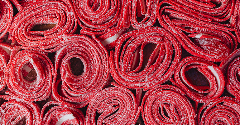News
California toxic panel approves ban on five chemical food additives
24 Apr 2023
The California Assembly’s toxic panel has approved a ban on five food additives – brominated vegetable oil, potassium bromate, propyl paraben, Red Dye No. 3, and titanium dioxide – in food and drink products, with supporters hoping brands will reformulate products nationwide.
On 18 April, the California Assembly’s Committee on Environmental Safety and Toxic Materials approved a bill to ban the five chemicals from candy, cereals, and other processed food on the grounds they are harmful to health.

Potassium bromate is an oxidising agent used as a flour improver in processed baked goods, such as bread while propyl paraben is a preservative. Brominated vegetable oil is used as an emulsifier in citrus-flavoured drinks to prevent the flavours from separating. Titanium dioxide is used to add a white, opaque appearance to foods and supplements while Red Dye No. 3 is a red food colouring.
All the additives have been linked to serious health problems, such as a higher risk of cancer, nervous system damage, and hyperactivity, and have all been banned for use in food in the EU with the exception of Red No. 3, which can be used in candied cherries.
A proposed ban on additives – not on food products
The bill, AB 418, was proposed by assembly member Jesse Gabriel and was co-sponsored by consumer rights watchdog Consumer Reports and the non-profit organisation, Environmental Working Group. The bill must now go to the California Assembly’s Appropriations Committee for consideration.
Gabriel was quick to assuage fears voiced by opponents of the bill that it would result in the prohibition of certain candy and other confectionery products.
“There is no realistic chance that this bill will result in Skittles or any other product being pulled off the shelf,” said Gabriel, chair of the Assembly Committee on Privacy and Consumer Protection. “The idea here is for these companies to make minor modifications to their recipes so that these products no longer include dangerous and toxic chemicals.”
“Skittles and many other brands have already made changes to their recipes in the European Union, the United Kingdom and other nations where these chemicals are banned. While the chemical companies might want you to believe we’re going too far with this bill, we are in fact many steps behind the rest of the world. We simply want our kids to have the same protection.”
Additives approved by the chemical industry – not safety regulators
On 23 March, the National Confectioners Association (NCA) issued a statement saying it strongly opposed AB 418 because there was no evidence to support banning the ingredients.
“The ingredients that would be banned under this proposal have all been approved by the US FDA,” it said. “Food safety is the number one priority for US confectionery companies, and we do not use any ingredients in our products that do not comply with the FDA’s strictest safety standards.”
Responding to the NCA’s statement, however, EWG and Consumer Reports noted that the FDA is not required to re-review additives if new research raises safety concerns. This means that the FDA has virtually no oversight of new chemicals added to the food supply, they noted.
More than 10,000 chemicals are permitted for use in food in the US, and almost 99% of the additives have been approved for use in food since 2000 were approved by the food and chemical industries – not by the Food and Drug Administration (FDA), said EWG and Consumer Reports.
According to a peer-reviewed 2020 scientific review written by independent food safety researchers, the FDA is “uninformed of potentially harmful GRAS substances in foods”, despite the fact that the Government Accountability Office (GAO) published a report to Congress calling on the FDA to strengthen its oversight of food ingredients determined to be Generally Recognized As Safe (GRAS) over 10 years ago.
Consumer Reports: Bill will encourage brands to make foods safer across US
Brian Ronholm, director of food policy at Consumer Reports, said: “Despite the serious and well-documented risks posed to our health by these five food chemicals, the FDA has failed to take action to protect the public.
“At a time when the FDA’s weak oversight has prevented it from taking action, it is critical for states like California to ensure consumers are protected from these toxic food chemicals. By removing these harmful chemicals from candies, cookies and other processed food, this bill will protect Californians and encourage manufacturers to make their products safer for the rest of the country,” he said.
A joint statement issued by Consumer Reports and the EWG said that additives are not adequately regulated by the Food and Drug Administration, largely due to a lack of funds from the US Congress.
“For decades, the FDA has failed to keep us safe from toxic food chemicals,” said Scott Faber, EWG senior vice president for government affairs. “The chemical companies keep exploiting a loophole that allows for food additives that have not been adequately reviewed for safety by the FDA. And the FDA consistently fails to reassess chemicals, even in light of new science. The food and confectioners industries know the review process at the FDA is broken.
“In the absence of federal leadership, it’s up to states like California to keep us safe from dangerous chemicals in candy, cookies and other foods our families enjoy,” said Faber.
Related news

California companies required to disclose heavy metal content in baby food
10 Jan 2025
As of January 2025, baby food manufacturers selling in California must disclose test results for four heavy metals – arsenic, lead, cadmium, and mercury – via an on-pack QR code.
Read more
Snack trends, ingredient claims, and plant-based perceptions: Highlights from Fi Europe 2023, part 1
7 Dec 2023
Value-led snacking, sustainability storytelling, and the importance of having a ‘star ingredient’: we asked consumer analysts and market experts at Fi Europe about the trends and innovations that are shaping the food industry.
Read more
Confirmed: California bans four ‘toxic’ food additives
10 Oct 2023
Four food additives, including the colouring Red No. 3, will be banned in food in the US state of California over safety concerns, with public health campaigners hoping this will spark a nationwide ban in the coming years.
Read more
Advocacy groups condemn EU Commission for backpedalling on animal rights
3 Oct 2023
Amid rumours that the EU may abandon its plans to improve animal welfare in farming and end the use of cages, many stakeholders have condemned this possibility and urged the EU to reconsider.
Read more
Poland and Ukraine attempt to resolve grain dispute
29 Sep 2023
Poland and Ukraine have begun talks to try to resolve a dispute regarding the ban on Kyiv’s grain imports that prompted Kyiv to file a lawsuit to the World Trade Organization.
Read more
The EU may be set to scrap its sustainability commitments
27 Sep 2023
A speech delivered by President Ursula von der Leyen last week inferred that the EU could be drawing back on its commitments to create a more sustainable and healthier food system.
Read more
Industry first: Mosa Meat becomes first cultivated meat startup to gain B Corp certification
11 Sep 2023
A first for the industry, Dutch cultivated meat company Mosa Meat announced that it has received B Corp certification and will soon apply for regulatory approval across the globe.
Read more
German supermarket trials climate-centric pricing model
29 Aug 2023
German discount supermarket Penny has trialled increasing product prices to mirror their health and environmental costs.
Read more
EPR fee delay spurs concerns over UK’s sustainability commitment
8 Aug 2023
The UK government’s decision to push back the introduction of fees for the Extended Producer Responsibility (EPR) due to inflation has raised doubts about whether this sustainability commitment will ever be realised.
Read more
Latino-owned food startups tackle climate change
25 Jul 2023
A growing list of Latino-founded food and beverage startups in the US are putting sustainability at the forefront of their businesses for the sake of the planet.
Read more